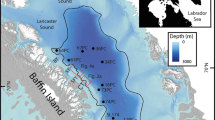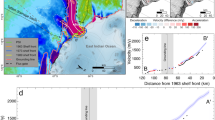Abstract
THE breaking up of ice shelves around the Antarctic Peninsula has been cited1 as a “sign that a dangerous warming is beginning in Antarctica”. Here we present satellite images showing the disintegration of the Wordie Ice Shelf, which lies off the west coast of the Antarctic Peninsula (Fig. 1). Fracture, either in the form of surface crevasses or rifts extending to the bottom of the ice shelf, has been responsible for iceberg calving and weakening the central region of the ice shelf. These fracture processes, which led to retreat of the ice front, were apparently enhanced by the presence of increased amounts of melt water, resulting from a warming trend recorded in mean annual air temperatures in Marguerite Bay. If this warming trend continues, other nearby ice shelves on the Antarctic Peninsula may be at risk. But substantial additional warming would be required before similar processes could initiate breakup of the Ross and Filchner–Ronne ice shelves, which help stabilize the West Antarctic ice sheet.
This is a preview of subscription content, access via your institution
Access options
Subscribe to this journal
Receive 51 print issues and online access
$199.00 per year
only $3.90 per issue
Buy this article
- Purchase on Springer Link
- Instant access to full article PDF
Prices may be subject to local taxes which are calculated during checkout
Similar content being viewed by others
References
Mercer, J. H. Nature 271, 321–325 (1978).
Ewan Smith, B. M. Br. Antarct. Survey Sci. Reports 72 (1972).
Reynolds, J. M. Br. Antarct. Survey Bull. 80, 57–64 (1988).
Walford, M. E. R. Nature 239, 95–96 (1972).
Doake, C. S. M. Nature 257, 780–782 (1975).
Hughes, T. J. Glaciol. 29, 98–117 (1983).
MacAyeal, D. R. & Thomas, R. H. Ann. Glaciol. 3, 189–194 (1982).
Lange, M. A. & MacAyeal, D. R. Ann. Glaciol. 12, 97–103 (1989).
Swithinbank, C. W. M. US Geol. Survey Professional Paper B-1386 (1988).
Talbot, M. H. Ann. Glaciol. 11, 161–164 (1988).
Morrison, S. J. Weather 45, 231–232 (1990).
Pollard, D. Tellus 32, 384–388 (1980).
Oerlemans, J. Nature 297, 550–553 (1982).
Liu, H. W. & Miller, K. J. J. Glaciol. 22, 135–143 (1979).
Sabol, S. A. & Schulson, E. M. J. Glaciol. 35, 191–192 (1989).
Robin, G de Q. J. Glaciol. 13, 543 (1974).
Jezek, K. C. J. geophys. Res. 89, 1925–1931 (1984).
Thomas, R. H. Br. Antarct. Survey Sci. Reports 79 (1973).
Doake, C. S. M. Ann. Glaciol. 3, 77–82 (1982).
Reynolds, J. M. Br. Antarct. Survey Bull. 54, 123–133 (1981).
Author information
Authors and Affiliations
Rights and permissions
About this article
Cite this article
Doake, C., Vaughan, D. Rapid disintegration of the Wordie Ice Shelf in response to atmospheric warming. Nature 350, 328–330 (1991). https://doi.org/10.1038/350328a0
Received:
Accepted:
Issue Date:
DOI: https://doi.org/10.1038/350328a0
This article is cited by
-
IceLines – A new data set of Antarctic ice shelf front positions
Scientific Data (2023)
-
Predicting impacts of climate change on the biogeographic patterns of representative species richness in Prydz Bay-Amery Ice Shelf
Journal of Oceanology and Limnology (2023)
-
Temporal Changes Over Major Antarctic Ice Shelve Margins During 2001–2016
Journal of the Indian Society of Remote Sensing (2020)
-
Trends and connections across the Antarctic cryosphere
Nature (2018)
-
Calving fluxes and basal melt rates of Antarctic ice shelves
Nature (2013)
Comments
By submitting a comment you agree to abide by our Terms and Community Guidelines. If you find something abusive or that does not comply with our terms or guidelines please flag it as inappropriate.



